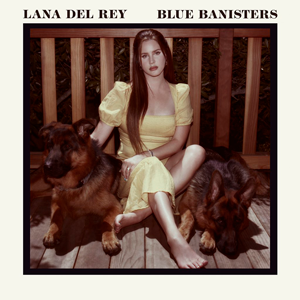‘Blue Banisters:’ a gentle shift in Lana Del Rey’s discography

Interscope Records, Polydor Records [Fair Use]
Lana Del Rey’s latest album represents the singer-songwriter’s familial connections.
November 5, 2021
Upon deleting all social media profiles, Lana Del Rey came out with a serene album that’s more personal than ever.
Touching and intimate, Blue Banisters marks a key point in Del Rey’s career. No longer burdened by the critics, press cycles, haters and sad girl persona, Del Rey breaks free from her pre-made world and builds her own reality — a reality twined with family, introspection, vulnerability and the wisdom gained 10 years after her major-label debut album, Born To Die.
The evolution of Del Rey’s music lets us know that even with the most misunderstood artists, there is still much to learn.
Stripping away from her long embodiment of Los Angeles glamour, Del Rey’s albums have grown increasingly poetic as they come. Her lyricism shines through with standout tracks like “Arcadia,” “If You Lie Down With Me,” “Thunder” and “Sweet Carolina.” Like Del Rey’s 2017 album, Lust for Life, which yields hip-hop features from A$AP Rocky, Playboi Carti and The Weeknd but also fuses with indie-rock features from Stevie Nicks and Sean Ono Lennon, Blue Banisters acts as a reminder that Del Rey is not only one of the most talented artists of our generation, but also one of the most versatile.
The album is the second one that Del Rey has pushed out in 2021. Its sister album, Chemtrails Over The Countryclub, released in March, seems long forgotten with the arrival of Blue Banisters. Ditching the producer of her last two albums, Jack Antonoff, the quality and tone of the album transitions from her recent contemporary piano ballads into anthems of sisterhood and solace, something seen in the beginning of her discography. The turn away from Antonoff came with the arrival of familiar producers like ex-boyfriend Barrie-James O’Neill, Mike Dean and Rick Nowels. The closing track, “Sweet Carolina,” serves as a full-circle transformation of Del Rey’s poeticism, hosting her dad, Robert, and sister, Chuck, as co-writers. “We love every hair on your head / Love you, like God loves you / And you say that you’re scared / Might be unprepared for having the baby blues / Baby blues, baby / If things ever go wrong, just know this is your song / And we love you.”
Again, the motif of blue reappears constantly in Del Rey’s music as a symbol of transformation; however, this time the color is connotated with sadness. “Baby blues” is used to describe Chuck Grant, Del Rey’s sister, who has recently given birth. The family ties are strong in this album, and the simple lyrics are found throughout the album with tracks like “Black Bathing Suit.” “Grenadine quarantine, I like you a lot / It’s L.A., “Hey” on Zoom, Target parking lot / And if this is the end, I want a boyfriend / Someone to eat ice cream with, and watch television / Or walk home from the mall with.”
Her lyrics take place in a very modern setting, dating this album to 2020-2021; however, it doesn’t come as a surprise that many of the tracks on Blue Banisters are unreleased songs intended for previous albums. Del Rey, being the queen of unreleased music, decided to release “Nectar of the Gods,” “Cherry Blossom” and “If You Lie Down With Me,” tracks scrapped from her 2014 album, Ultraviolence. On top of that, Del Rey decided to release “Thunder” and “Dealer,” two scrapped tracks from her unreleased 2017 collaborative album with indie-rock band The Last Shadow Puppets. The effect of Del Rey’s scrapbook-like approach to album making arrived with a heavenly outcome, but on the other hand, it lacks the cohesiveness found in other Del Rey projects.
Blue Banisters faithfully embodies the lyrics from her 2017 track, “Get Free:” “And now I do, I wanna move / Out of the black (out of the black) / Into the blue (into the blue).” The newfound transparency and normality relates with listeners in ways her music has never before, and serves as a direct attack against the critics who have continuously painted her out to be an artist who glamorizes misery. Blue Banisters reverses that narrative — Del Rey is simply a glamorous person who sings about sad things. Amid the chaos in the world, one thing is for sure: Del Rey will do it her way.








